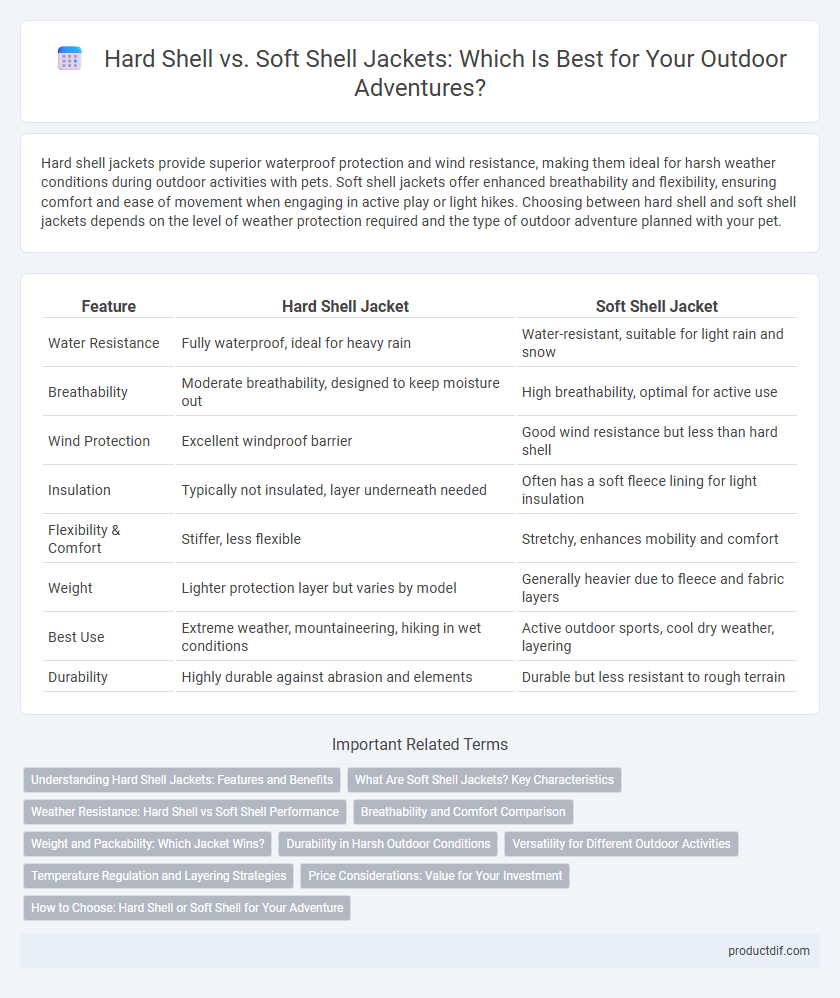Hard shell jackets provide superior waterproof protection and wind resistance, making them ideal for harsh weather conditions during outdoor activities with pets. Soft shell jackets offer enhanced breathability and flexibility, ensuring comfort and ease of movement when engaging in active play or light hikes. Choosing between hard shell and soft shell jackets depends on the level of weather protection required and the type of outdoor adventure planned with your pet.
Table of Comparison
| Feature | Hard Shell Jacket | Soft Shell Jacket |
|---|---|---|
| Water Resistance | Fully waterproof, ideal for heavy rain | Water-resistant, suitable for light rain and snow |
| Breathability | Moderate breathability, designed to keep moisture out | High breathability, optimal for active use |
| Wind Protection | Excellent windproof barrier | Good wind resistance but less than hard shell |
| Insulation | Typically not insulated, layer underneath needed | Often has a soft fleece lining for light insulation |
| Flexibility & Comfort | Stiffer, less flexible | Stretchy, enhances mobility and comfort |
| Weight | Lighter protection layer but varies by model | Generally heavier due to fleece and fabric layers |
| Best Use | Extreme weather, mountaineering, hiking in wet conditions | Active outdoor sports, cool dry weather, layering |
| Durability | Highly durable against abrasion and elements | Durable but less resistant to rough terrain |
Understanding Hard Shell Jackets: Features and Benefits
Hard shell jackets offer superior waterproofing and wind resistance, utilizing durable, breathable fabrics like Gore-Tex to keep adventurers dry and protected in extreme weather conditions. Their robust construction includes sealed seams and storm flaps, preventing water ingress while maintaining ventilation to regulate body temperature during high-intensity activities. Ideal for mountaineering and harsh environments, hard shell jackets provide essential protection without compromising mobility or layering flexibility.
What Are Soft Shell Jackets? Key Characteristics
Soft shell jackets are designed with flexible, breathable fabrics that offer excellent moisture-wicking and stretchability, optimal for active outdoor activities. They provide moderate water resistance and windproof capabilities, making them suitable for variable weather conditions without the bulk of hard shells. Key features include lightweight construction, enhanced ventilation, and superior comfort during high-intensity movement.
Weather Resistance: Hard Shell vs Soft Shell Performance
Hard shell jackets provide superior weather resistance with waterproof and windproof materials, making them ideal for extreme rain and snow conditions. Soft shell jackets offer enhanced breathability and flexibility but typically deliver moderate weather protection, suitable for light rain and cooler, dry environments. Choosing between the two depends on the intensity of weather exposure and activity level during outdoor adventures.
Breathability and Comfort Comparison
Hard shell jackets offer superior waterproof and windproof protection but typically have lower breathability, making them less comfortable during high-exertion activities. Soft shell jackets prioritize breathability and flexibility, providing enhanced comfort and moisture-wicking properties ideal for active outdoor conditions. Choosing between the two depends on the balance needed between weather protection and ventilation for specific outdoor pursuits.
Weight and Packability: Which Jacket Wins?
Hard shell jackets, typically made from heavier, more robust materials like Gore-Tex, excel in durability and weather resistance but add noticeable weight and bulk to your pack. Soft shell jackets are lighter and compress more easily, enhancing packability for agile outdoor activities without sacrificing moderate weather protection. Choosing between the two depends on prioritizing lightweight convenience versus maximum protection in harsh conditions.
Durability in Harsh Outdoor Conditions
Hard shell jackets offer superior durability in harsh outdoor conditions due to their robust waterproof and windproof materials, typically made from high-denier nylon with reinforced seams. Soft shell jackets provide enhanced flexibility and breathability but generally lack the abrasion resistance and full waterproof protection needed for extreme environments. For activities in rugged terrain with exposure to heavy rain, snow, or sharp rocks, hard shell jackets ensure longer-lasting performance and reliable protection.
Versatility for Different Outdoor Activities
Hard shell jackets provide superior waterproofing and wind resistance, making them ideal for harsh weather conditions like heavy rain or snow during mountaineering and alpine climbing. Soft shell jackets offer greater breathability and flexibility, perfect for high-intensity activities such as hiking, trail running, and skiing where moisture management and comfort are priorities. Choosing between hard shell and soft shell depends on the balance of protection versus mobility required for specific outdoor adventures.
Temperature Regulation and Layering Strategies
Hard shell jackets offer superior protection against wind and rain, making them ideal for harsh weather conditions, but they often lack breathability, which can lead to overheating during high-intensity activities. Soft shell jackets excel in temperature regulation through enhanced breathability and flexibility, providing better comfort in mild to moderate conditions but offering less waterproofing. Effective layering strategies combine a moisture-wicking base layer, an insulating mid-layer, and a hard shell for severe weather or a soft shell for active, variable temperatures.
Price Considerations: Value for Your Investment
Hard shell jackets typically command higher prices due to advanced waterproof and windproof materials, offering long-term durability and protection in extreme conditions. Soft shell jackets provide greater breathability and flexibility at a lower cost, making them ideal for moderate weather and active use. Evaluating the jacket's intended purpose and durability ensures better value for your investment in outdoor gear.
How to Choose: Hard Shell or Soft Shell for Your Adventure
Hard shell jackets offer superior waterproof and windproof protection, making them ideal for extreme weather conditions and heavy rain during outdoor adventures. Soft shell jackets provide greater breathability and flexibility, suited for high-intensity activities in mild to moderate weather where comfort and mobility are prioritized. Choosing between hard shell and soft shell depends on the specific environment and activity level, balancing weather protection with breathability and comfort.
Hard Shell vs Soft Shell Jacket Infographic

 productdif.com
productdif.com